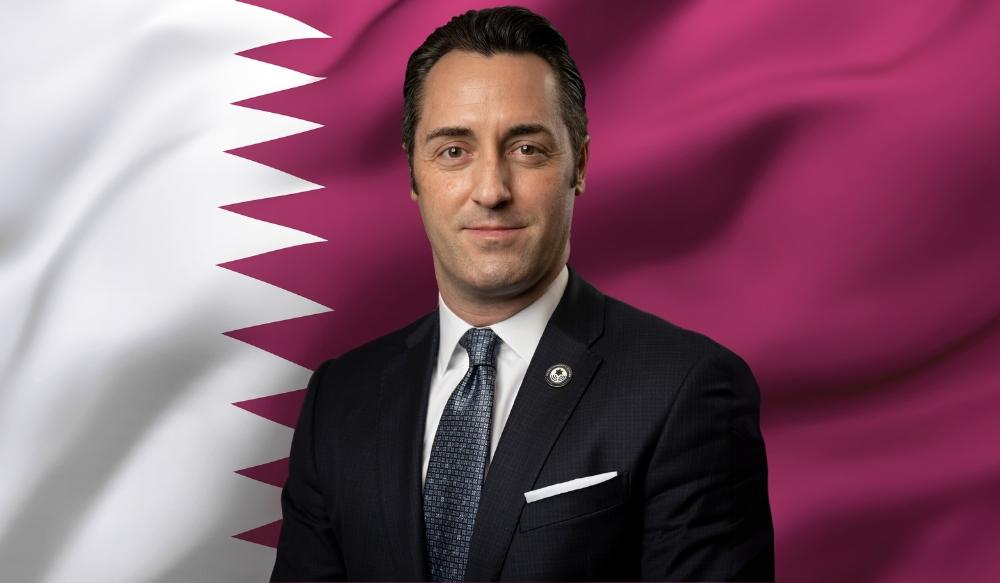Michael G. Masters holds a key position in the security of American Jews, being national director and CEO of the Secure Community Network (SCN) – the community’s umbrella security organization that works to safeguard Jewish institutions across the United States. Concurrently until February of 2022, he was president of the board of governors of the Soufan Center, and also general counsel for the Soufan Group. Mr. Masters previously served as the chief of staff to the superintendent of the Chicago Police Department and as head of Emergency Management for Cook County, Illinois. He is a U.S. Marine Corps reservist and graduate of Harvard law school.
Is Mr. Masters with the Jews who were murdered – or their murderers?
Why, then, has Mr. Masters been part of management and on the payroll of a company that provides security consulting, training, and military advising to Qatar, a key sponsor of Hamas?
The October 7 slaughter of over 1,400 men, women, and children in Israel, plus the kidnapping of 200 more by Hamas, directly implicated Qatar, which funded Hamas, hosted its leadership, and blamed Israel for October 7.
Is Mr. Masters with the Jews who were murdered – or their murderers?
Qatar has a long history of supporting terrorism: it provided refuge and aid to Khalid Sheikh Mohammed, Taliban leader Mullah Abdul Ghani Baradar, and Hamas politburo chiefs Khaled Mashal and Ismail Haniyeh. The country’s largest charity has funded Al Qaeda in the Arabian Peninsula (AQAP), Hamas, and Ihsani Yardim Vakfiih (IHH). It has paid bribes to Hezbollah and other terror groups in Iraq.
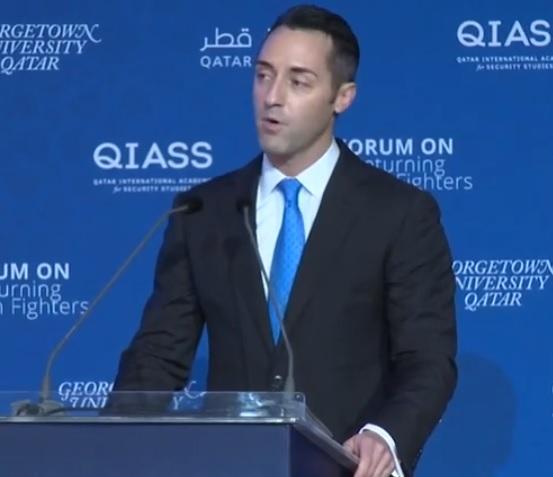
And now, we come to Mr. Masters, former president of the Soufan Center, one time emcee of the Qatar International Academy for Security Studies’ (QIASS) Global Security Forum events in Doha, and national director & CEO of the Secure Community Network (SCN) and a principal figure in all three.
The Soufan Group: Mr. Masters publicly acknowledges having worked at the Soufan Group from October 2015 to March 2020, then serving as president of the board of governors of the Soufan Center, an affiliated think tank, through February 2022. The Soufan Group, headquartered in New York, maintains an office in Doha, Qatar. According to a SCN spokesperson, “Mr. Masters is proud of his past service as a member of the Board of Directors of The Soufan Center.”
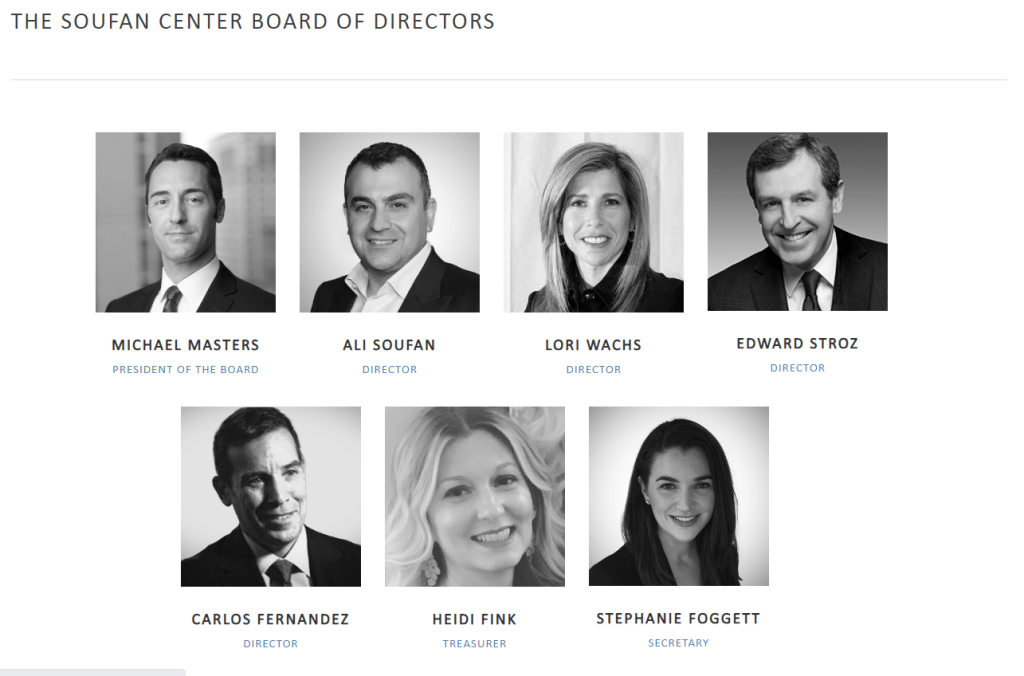
Ali Soufan, CEO of the Soufan Group, established in New York in 2005, counts the government of Qatar as a client “which hired the Soufan Group to train some of its police and intelligence forces.” The Qatari state-owned news network, Al Jazeera, frequently interviews employees of the Soufan Center on matters of national security and Middle East politics, which prominently showcases these on its website.
Qatar International Academy for Security Studies’ (QIASS) Global Security Forum: Established in 2018, the Global Security Forum (GSF) is a yearly policy conference hosted by the Soufan Center. Qatari leaders often brief the gathered audience of security officials, diplomats, and journalists to articulate and comment on Doha’s annual national security strategy commenting on such topics as Afghanistan, Israel, and Gulf politics. Mr. Masters introduced senior Qatari officials at multiple conferences and moderated panels at the conference.
Secure Community Network: It is the “official homeland security and safety initiative of the organized Jewish community in North America.” The group “serves as the central organization dedicated exclusively to the safety and security of the American Jewish community, working across 146 federations, 50 partner organizations, over 300 independent communities as well as with other partners in the public, private, non-profit and academic sectors,” including the FBI, DEA, and other federal agencies. Mr. Masters is its CEO.
Mr. Masters held his positions at SCN and different Soufan entities concurrently for at least four years from 2018-2022, as well as appearing at the GSF multiple times.
He stands as a testament to the tangled relationship between Qatar and organizations safeguarding the U.S. Jewish community. His former positions raise considerable concerns about potential conflicts of interest, especially in light of his public appearances and associations with key Qatari figures while serving as the American Jewish community’s security czar.
While Iran’s alliance with Hamas is the focus of global attention, Qatar – whose ties to the terror group are ironclad – is often overlooked. Such willful blindness is, in part, the fruit of Qatar’s vast international networks, which include major American lobbyists, journalists, and security experts, not to mention the globally influential aforementioned Qatari-owned Al Jazeera network. Moreover, the U.S. Air Force base at Al Udeid in Qatar furthers its strategic importance.
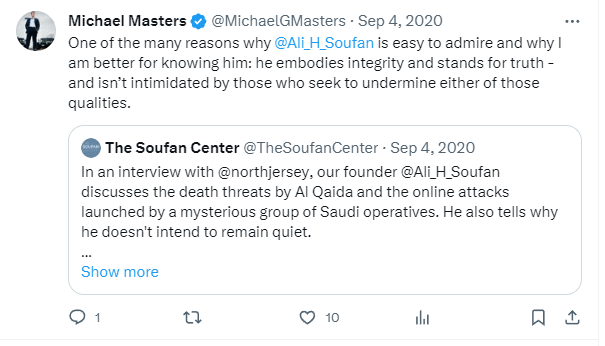
Qatari Donations to American Universities: A Conduit for Antisemitism?
One of the more overt demonstrations of this influence is Qatar’s financial backing of prominent U.S. academic institutions, to which they channel billions of dollars in donations. This raises concerns about their ability to inspire antisemitism, particularly among future decision-makers. Furthermore, Qatar’s Education City is home to institutions like Hamad Bin Khalifa University (HBKU), which houses the Al-Qaradawi Center for Islamic Reform and Renewal. This Center is named for Yusuf Al-Qaradawi, the late Islamist scholar and Muslim Brotherhood advocate who endorsed Hamas suicide bombings and the murder of Americans in Iraq.
Stateside, the Qatar America Institute (QAI) serves as a case study for Qatar’s intricate web of influence peddling in the U.S. The organization, though introduced as a cultural non-profit, was later found to have accepted $6 million from the Qatar Embassy and the Qatar Foundation. This funding reportedly facilitated visits for rising U.S. politicians to Qatar, thereby providing an opportunity for covert influence. Mr. Soufan and other Soufan Group staff and advisors have served on the board of directors for QAI.
QIASS/HBKU and QF have organized a multitude of conferences in Doha since 2017. The latest of these was attended and inaugurated by the U.S. Secretary of Homeland Security, who gave speeches alongside HBKU officials. Several attendees, principally Qataris, have used these events to make anti-Israel remarks and express support for President of Turkey Recep Tayyip Erdoğan and radical groups like Hamas.
A Tangled Web of Qatari Connections
A particularly glaring instance from October 2018 underscores concerns about Mr. Masters’ Qatari ties. In the immediate aftermath of the tragic shooting in Pittsburgh, the most devastating attack against the U.S. Jewish community, Mr. Masters was not on-site to support the community or offering condolences. Instead, he was in Qatar.
During his address, he introduced himself solely as the president of the Soufan Center, conveniently neglecting to mention his pivotal role in SCN. He failed to mention the Pittsburgh murders and instead praised his forum co-sponsors, including Qatar University and Georgetown University Qatar. At the same period, the dean of Georgetown University Qatar was actively criticizing Israel. Moreover, Mr. Masters introduced and commended the deputy prime minister of Qatar, Abdullah bin Hamad Al Attiyah, even suggesting that attendees should follow him on Twitter.
Concurrently with tenure at SCN, Mr. Masters held positions in multiple entities directly linked to the Qatari regime. He was a member of the executive team for the Soufan Group and board of directors for the Soufan Center, entities mainly engaged with Qatar’s Emir, family, and government. Both Ali Soufan and Michael Masters were appointed to the U.S. Department of Homeland Security Advisory Council. In 2022, a colleague, former Marine Gen. John Allen, from the council, who served with Messrs. Soufan and Masters, had to take a leave of absence due to an FBI investigation on alleged illegal lobbying and Qatari influence peddling.
The Soufan Group manages the Qatar International Academy for Security Studies (QIASS), providing training to law enforcement personnel, including Qatar’s general security services. The specialized training provided includes intelligence, investigation, firearms, tactical support, human source development, interview and interrogation techniques, and CVE strategy. QIASS also provided guidance for the controversial World Cup when Qatar hosted it. Ali Soufan is the chief principle of the Soufan Group; Michael Masters was formerly the senior vice president and of counsel.
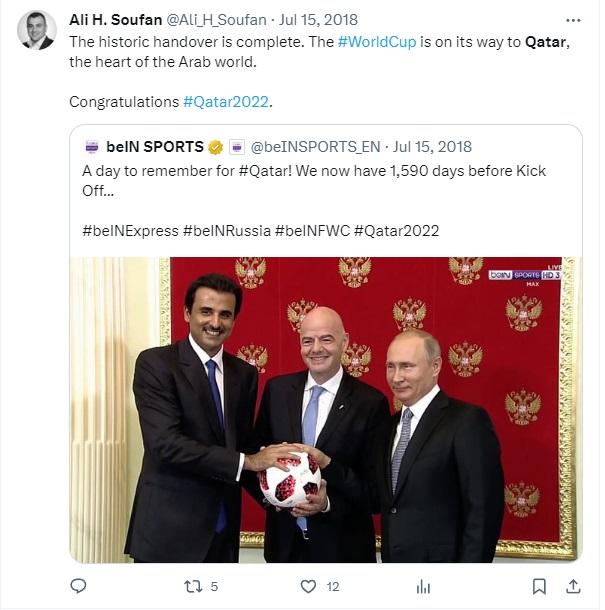
A recent investigation in the U.K. Spectator focused on Qatar’s human rights breaches and its relationship to the World Cup by examining the supposed lobbying that influenced British MPs and their trips to Doha. Multiple reports have highlighted QIASS as a major influencer for these trips, and there are indications that these QIASS-sponsored MP excursions are currently being examined by the British government. This scrutiny spurred anti-corruption entities of the EU to detain several government officials in December 2022 over suspicions of corruption stemming from alleged bribes by Qatari representatives.
Additionally, the Soufan Center’s intel briefs, released amidst the recent tensions, reflect a skewed perspective that inadvertently validates illicit tactics as strategies for negotiation. Intended for national security professionals, the briefs implied potential breaches of international law by Israel in their response to Hamas. They categorize Hamas terrorists as “militia fighters,” suggest that the humanitarian situation in Gaza is deteriorating due to Israeli actions, and use the term “extreme” just once – applying it to Israeli political elements. A particular statement from October 13th indicated that Israel might be violating the Geneva Conventions through “siege warfare.” The brief also posited that Hamas’s “hostage portfolio” might be a tool for progress on humanitarian issues, indirectly endorsing nationalistic tactics to initiate international dialogue and negotiations.
While the QIASS/Soufan website features Ali Soufan as executive director and Martin Reardon as senior director, Majed Al-Ansari, the actual president of QIASS, is conspicuously absent. Mr. Al-Ansari’s association with QIASS is, however, confirmed by the HBKU’s official website, as well as multiple business and academic agreements. Mr. Masters has been vocal about his association with HBKU’s leadership and has often highlighted the relationship on social media platforms, as this tweet illustrates.
In 2022, Mr. Al-Ansari took on the role of special advisor to the deputy prime minister and minister of foreign affairs and also became the official spokesperson for the regime, roles he holds simultaneously with his position as president of QIASS.
Al-Ansari also writes columns for Qatari newspapers. In a 2021 column, he applauded Hamas’s skirmish with Israel and advocated for Israel’s annihilation.
U.S. Jewish Security: In Qatar’s Hands?
On June 17, 2020, Mr. Masters was featured in an article titled “The World’s Top Jewish Security Official Says Its Time to Address Bias in Synagogue Protection.” It noted Mr. Masters’ belief that the Jewish community needs law enforcement against threats while also suggesting the police should support minority and gay communities facing biased and violent policing. Mr. Masters made these remarks without disclosing the Soufan Group and Soufan Center’s relationship with the Qatari regime and its security apparatus, some of which were alleged to have enforced anti-LGBTQ activities during the World Cup.
In the academic year of 2019-2020, Hillel International reported a spike in antisemitic incidents at North American colleges. By 2021 and 2022, violent events became more regular. Securing Jewish students on American campuses is well within the mandate of SCN.
A Jewish Federations of North America press release on October 23rd of this year stated, “according to the Secure Community Network (SCN) and ADL, anti-Israeli activists and organizations like BDS, National Students for Justice in Palestine, the Boston Mapping Project, and the Council on Islamic American Relations (CAIR) have already flooded the Internet with messaging that blames Israel rather than Hamas nationalists for the current crisis.” In 2020, SCN partnered with Hillel (the national Jewish student group umbrella organization), to combat BDS campaigns on college campuses.
Students at the Qatar Foundation openly support the global Boycott, Divestment, and Sanctions movement and host events at the organization’s facilities in Doha.
Brooke Goldstein, CEO of the Lawfare Project, has alleged, “the bulk of all Middle Eastern donations [to American colleges and universities] come from Qatari donors, and one entity — Qatar Foundation — accounts for virtually all of the donations from Qatar. Qatari cash helped to incubate the Boycott, Divestment and Sanctions (BDS) campaign on U.S. college campuses.”
Disturbingly, many of these students have faced threats and physical harm from groups and individuals affiliated with BDS movements, allegedly funded by the Qatar Foundation (QF). Yet QF has financed events for Mr. Masters’ Soufan Center in Doha, Qatar. These ties extend to Qatar University, where Abdul Jabbar Saeed, who heads the university’s Quran and Sunnah department, took to Al Jazeera in May 2020 to cite a prophecy about Muslims killing Jews.
Mr. Masters’ Jewish communal organization touted its work combatting BDS while the think tank whose board of governors he served on was taking money from a virulently anti-Israel organization that organized BDS activity at its main headquarters.
Qatar’s influence, both overt and covert, within the U.S. national security framework raises pressing concerns. The blurred lines between organizations designed to ensure the security of American Jewish communities and entities with potential antisemitic interests demand immediate scrutiny.
This convoluted matrix of monetary transactions, alliances, and partnerships reveals worrisome vulnerabilities in U.S. national security, especially concerning its Jewish community. The undeniable extent of Qatar’s reach, from its substantial donations to academic establishments to its ties within the U.S. political and national security infrastructure, is alarming. Even more distressing is the blurring of boundaries between institutions committed to protecting American Jewish communities, and those potentially harboring antisemitic sentiments.
A thorough investigation into Mr. Masters’ links to Qatar is both necessary and urgent.
It is crucial to understand these connections to ensure the unwavering commitment of those responsible for safeguarding vulnerable communities. Failing to address these ties could have grave consequences, not just for the Jewish community, but for American democratic values.
Given the vast mosaic of these connections, one cannot help but conclude that a thorough investigation into Mr. Masters’ links to Qatar is both necessary and urgent. The American Jewish community, like any other, deserves transparency, especially when it pertains to the very security entities meant to protect it. It is vital to ascertain whether the man at the forefront of their protection can effectively balance his roles, or if his allegiance to one might jeopardize his commitment to the other.
Mr. Masters and Mr. Soufan were both sent detailed queries regarding this story. Mr. Masters response, sent on his behalf by SCN, is published below as Appendix I. The questions sent to Mr. Masters are published below as Appendix II. Mr. Soufan did not respond before publication.
Mr. Masters praised the government of Qatar in opening remarks he gave to the Global Security Forum in Doha in 2021, “For their support in fostering a space for the open and honest exchange of ideas we extend our thanks to the government of Qatar.” He continued, commenting on his role as CEO of SCN, “I see this in my work as director of the Secure Community Network in the United States every day. We are all connected. The solutions require a whole of community approach . . . the global security situation is complex. The threats are serious and the dangers are real.” Hopefully, Mr. Masters realizes the danger of Hamas, and its sponsor in Doha. He should distance himself from his former Qatari connections and condemn the Islamist peninsular regime for what it really is: A danger to global security and the American Jewish community he has sworn to protect.
Can one truly serve two masters, especially when one of those entities might have interests diametrically opposed to the community he serves?
Gregg Roman is director of the Middle East Forum. Winfield Myers is MEF’s managing editor and director of its Campus Watch Project.
APPENDIX I
Mr. Masters was given an opportunity to respond in writing to seventeen questions before the publication of this story. Secure Community Network sent the following statement to FWI on behalf of Mr. Masters:
We are in receipt of your seventeen questions for Mr. Masters, regarding his prior role as a member of the Board of The Soufan Center, an American nonprofit 501(c)(3).
It appears that, between the tenor of the questions as well as the timeline to answer them, you are more interested in smearing Mr. Masters and undermining the work of the Secure Community Network than a substantive piece of research.
Mr. Masters is proud of his past service as a member of the Board of Directors of The Soufan Center, an American 501(c)(3). In that role, and in his previous roles in both government and civil society, Mr. Masters worked with security experts from numerous countries across Europe, Asia, Africa, and the Middle East. Any suggestion that there is something inappropriate with that demonstrates a total ignorance of the important work done by US government officials and members of the nonprofit, academic, and private sectors, and the relationships that result from these efforts – particularly in the national security space. It is thanks, in part, to these numerous relationships that Israeli and American officials are better able to protect our Jewish communities.
Mr. Masters is fully engaged with his team at the Secure Community Network to protect the Jewish people in North America. This is a continuation of his approximately twenty years of public service as a professional devoted to the domestic and national security interests of the United States of America, and the Jewish people.
Please know Mr. Masters takes his record of service and reputation seriously, as does all our team. Any factual inaccuracies will be addressed to the fullest extent, possible.
APPENDIX II
In the interest of fair and accurate reporting, FWI sent Mr. Masters the following questions before the publication of this story. He did not respond to any of the queries listed below:
- Nature of Affiliations: Can you describe the nature of your relationship with the Qatar International Academy for Security Studies (QIASS) and the Soufan Center? Our understanding is that you were president of the board of directors of the Soufan Center through at least 2022.
- Balancing Dual Roles: How do you navigate the balance between your commitment to SCN and your current/previous roles in organizations affiliated with the Qatari government, given the potential conflicts of interest?
- Pittsburgh Shooting Incident: During the tragic Pittsburgh shooting in October 2018, you were engaged in activities in Qatar at their Global Security Forum. Can you shed light on the nature of these activities and address concerns raised about your whereabouts during this crisis?
- Addressing Concerns of Influence: Given the alleged connections of Qatar to groups and sentiments contrary to the safety and security of the Jewish community, how do you address potential concerns that Qatari influence might be seeping into SCN’s operations?
- Soufan Center’s Perspective: There’s been biased terminology and framing in the Soufan Center’s intel briefs regarding Israel. Can you elucidate the stance of the Soufan Center on this matter, and if not the Center’s, perhaps your own – and clarify the choice of terms used?
- Disclosure Practices: In situations where there may be potential conflicts of interest, how do you approach disclosure, especially considering your business ties with entities associated with the Qatari government?
- Connection with Majed Al-Ansari: Can you elaborate on your professional association with Majed Al-Ansari, President of QIASS, and his roles within the Qatari government?
- Qatar’s Funding of U.S. Academic Institutions: Are you aware of Qatar’s financial backing of prominent U.S. academic institutions? How do you reconcile this with your roles in organizations tied to the Qatari government?
- The Qatar-America Institute’s Influence: Given your affiliations, can you comment on the role and influence of the Qatar-America Institute within the U.S., especially regarding its introduction as a cultural non-profit?
- Concerns About Anti-Semitic Sentiments: What is your perspective on the concerns raised about fostering anti-Semitic sentiments in institutions linked to Qatari funding?
- BDS Movements & the Qatar Foundation: With the alleged funding of BDS movements by the Qatar Foundation, which has also financed events for the Soufan Center in Doha, how do you address potential conflicts or concerns within the Jewish community?
- Abdul Jabbar Saeed’s Statements: Given the statement made by Dr. Abdul Jabbar Saeed, professor at HBKU, about a prophecy related to Muslims and Jews, how do you view your direct or indirect association with entities connected to such remarks?
- Violence on American Campuses: Given the recent spike in anti-Semitic incidents on North American campuses, how does SCN plan to address these, especially in light of alleged ties between Qatar-backed entities and some of these violent events?
- QIASS-Sponsored Trips: There have been reports about QIASS-sponsored trips for British MPs. Can you shed light on the nature of these excursions and the role of the Soufan Center or QIASS in organizing them?
- Lobbying Allegations: In light of recent investigations into alleged illegal lobbying and Qatari influence peddling, what measures are in place to ensure transparency and ethical conduct in your dealings with Qatari entities?
- Position on Human Rights: How do you reconcile your commitment to security and protection, especially for the Jewish community, with the allegations of human rights breaches linked to the Qatari government?
- Future Engagements with Qatar: Given the concerns raised, will there be any changes to your engagement or the engagement of entities you are associated with, regarding Qatar in the future?
